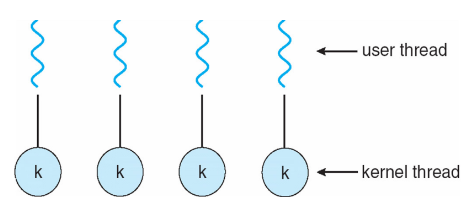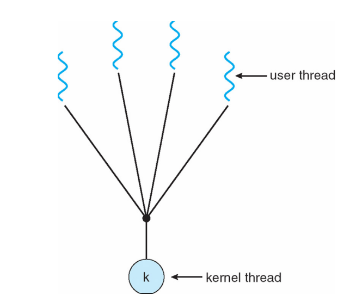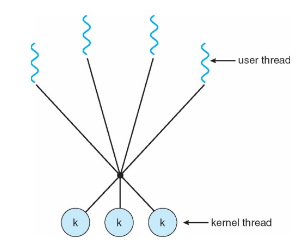POSIX Threads API
pthread_create
int pthread_create(
pthread_t *thr,
pthread_attr_t *attr,
void *(*fn)(void *),
void *arg
);
-
Create a new thread identified by thr which will execute fn with arguments arg.
- Can provide additional attributes through
attr
- stack size
NULL for default values
pthread_exit
void pthread_exit(void *return_value);
-
Destroy current thread and return a pointer to its return value
pthread_join
int pthread_join(phtread_t thread, void **return_value);
-
Wait for thread to exit and receive the return value
pthread_yield
void pthread_yield();
-
Tell the OS scheduler to run another thread or process if available
- Wait until yield or preempted
Functions like pthread_create can be implemented as a function in either:
- function call in user space → inexpensive
- system call in kernel space → expensive
Approach #1: Add pthread_create as a kernel thread (1:1)

- Uses less resources compared to creating a new process
- Still expensive
- System calls are expensive
Limitations
- Every thread operation goes through the kernel
- 1:1 correspondence between user and kernel threads
- thread operations are 10x-30x slower
- Kernel threads must please all sorts of application needs
- Heavy-weight memory management
Approach #2: Add pthread_create as user thread (n:1)

- Many threads but only one kernel thread per process
pthread_create, etc. are library functions
Implementation- Allocate new stack for each
pthread_create
- Keep queue of runnable threads
- Blocking describes moving from a running state to waiting state
- Replace blocking system calls with non-blocking ones
- Pre-emption
- Switch to another thread on timer
Limitations
- Cannot take advantage of multiple cores or processors
- Blocking system call blocks all threads
- Cannot switch since that requires kernel
- Uncached disk read
- page fault
- Possible Deadlock if one thread blocks on another
Approach #3: User threads on kernel threads (n:m)

- Multiple kernel threads per process
pthread_create, etc. are library functions
Limitations- Many of the same problems as n:1 threads
- Kernel does not know importance of each thread
- Might preempt one holding an important lock


